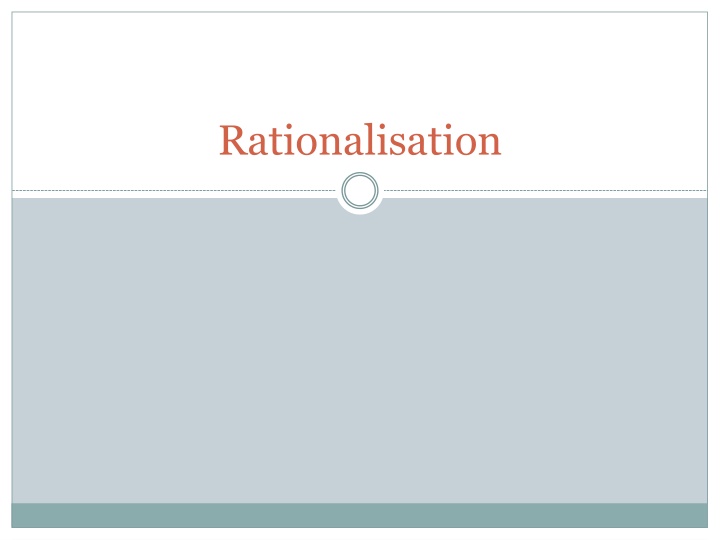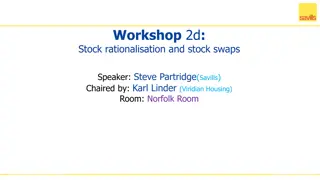Rationalisation
MAX WEBER: THE CONCEPT OF BUREAUCRACY - Learn about the characteristics and types of bureaucracy as defined by Max Weber. Explore the features of legal-rational bureaucracy and its significance in administrative structures. Delve into Weber's insights on the conditions for rational capitalism in modern society.
Download Presentation

Please find below an Image/Link to download the presentation.
The content on the website is provided AS IS for your information and personal use only. It may not be sold, licensed, or shared on other websites without obtaining consent from the author.If you encounter any issues during the download, it is possible that the publisher has removed the file from their server.
You are allowed to download the files provided on this website for personal or commercial use, subject to the condition that they are used lawfully. All files are the property of their respective owners.
The content on the website is provided AS IS for your information and personal use only. It may not be sold, licensed, or shared on other websites without obtaining consent from the author.
E N D
Presentation Transcript
MAX WEBER: THE CONCEPT OF BUREAUCRACY Weber described it as an administrative body of appointed officials . characteristics. never defined bureaucracy. He only He also described its As in the case of authority, Weber categorised bureaucracy in to (1) patrimonial bureaucracy found in traditional and charismatic authorities and (2) legal-rational bureaucracy found only in the legal type of authority.
Weber identified certain features of legal-rational bureaucracy. FEATURES OF LEGAL-RATIONAL BUREAUCRACY The model of legal-rational bureaucracy described by Weber (1) Official business is conducted on a continuous, regulated basis, (2) An administrative agency functions in accordance with specified rules and is characterised by three interrelated aspects; (a) the powers and functions of each official is defined in terms of impersonal criteria, (b) the official is given matching authority to carry out his responsibility and (c) the means of compulsion at his disposal are strictly limited and the conditions under which their employment is legitimate are clearly defined,
(3) Every official and every office is part of the hierarchy of authority. Higher officials or offices perform supervision and the lower officers and officials have the right to appeal, (4) Officials do not own the resources necessary for rendering the duties, but they are accountable for use of official resources. Official business and private affairs, official revenue and private income are strictly separated, (5) Offices cannot be appropriated by the officers as private property and (6) Administration is conducted on the basis of written documents.
CAPITALISM Max Weber identifies some important conditions for the development of rational capitalism in modern society Private ownership of all physical means of production, freedom of the market, mechanisation, written law and administration, free labour and commercialisation of economic life. Weber is far more impressed with the rationality of capitalist society and the systematic rationality of its social forms and processes. The modes of social organisation and association, and the very mentality of the people reflect rationality.
BUREAUCRACY According to Weber modern bureaucracy is social manifestation of formal rationality. Formal rationality implies the importance of rules and procedures rather than beliefs and sentiments. Bureaucracy s development is based on the separation of the rulers from the ruled, people from the position, and sentiments and beliefs from procedures and regulations.
Thus there are several senses in which Weber sees bureaucracy as a form of rationalisation. Among them those that need to be enumerated here are: (i) the systematisation of purposes and procedures (ii) rights and obligations based on established and clearly-defined norms for the purpose of efficiency, and (iii) most importantly, the rationalisation of the procedures of recruitment, promotion and retirement of bureaucrats through which their lives gain security and manageability. To Weber, bureaucracy is a structure of rational domination
TYPES OF RATIONALITY ZWECKRATIONAL AND WERTRATIONAL Weber identifies two distinct types of rationality. These are Zweckrational :(goal oriented/ ends based rationality); The Zweckrational is characteristic of modern, capitalist society and flows from goal- oriented social action. Zweckrational refers to rationalisation of means and goals/ ends. Reason and logical thinking are recommended in order to obtain one s desires.
Wertrational Wertrational, on the contrary, is characteristic of traditional social rationality formations. It is involved with morality and touches upon emotions, sentiments and beliefs. Societal approval of individual action is considered important. Weber believes that traditional societies did have rational elements in their social organisation, but these were defined in terms of values or moral norms. To give you an illustration, take agriculture in traditional (pre-capitalist) society. When to plough, when to sow or when to harvest the crop was determined by rational requirements of season, temperature or moisture in the soil. But at the same time these occasions were also sanctioned as morally desirable events. Festivities and rituals were prescribed for each of these events. or (value-based rationality);
MEANING OF RATIONALITY AND RATIONALISATION Rationality refers to those ideas and behaviours which are logically clear and consistent and responsive to empirical knowledge.
Rationalisation refers to the process whereby rationality is applied to various aspects and activities of life. Rationality is the distinctive characteristic of human beings has made it a central theme in Western philosophy for over two hundred years.
Max Weber was born in 1864 in Erfurt, Province of Saxony, Prussia. was a German sociologist, philosopher, jurist, and political economist, who is regarded today as one of the most important theorists on the development of modern Western society. Weber was the eldest son of Max and Helene Weber. His father was an aspiring liberal politician. Weber mother was raised in Calvinist orthodoxy. The conflicts between Weber s parents, contributed to the inner agonies that haunted Weber in his adult life.
After graduating from high school, Weber studied law, history, philosophy and economics for three semesters at Heidelberg University before spending a year in the military. After his release from the military, however, Weber was asked by his father to finish his studies at the University of Berlin. he resumed his studies in 1884, he went to the University of Berlin and spent one semester at G ttingen. He passed the bar exam in 1886 and earned his Ph.D. in 1889. Weber married a distant cousin, Marianne Schnitger, in 1893. He got a job teaching economics at Freiburg University the following year, before returning to Heidelberg in 1896 as a professor.
In 1897, Max had a falling out with his father, which went unresolved. After his father died in 1897, Weber suffered a mental breakdown. He was plagued by depression, anxiety and insomnia, which made it impossible for him to teach. He spent the next five years in and out of sanatoriums. When Weber was finally able to resume working in 1903, he became an editor at a prominent social science journal. Weber died of a lung infection in June 1920
WORK OF MAX WEBER Max Weber wrote The Protestant Ethic and the Spirit of Capitalism (1904 05), Economy and Society (1922), General Economic History (1923 BUREAUCRACY RATIONALISATION
To Weber rationalisation means that principally there are no mysterious incalculable forces that come into play, but rather one can, in principle, master all things by calculation. One need no longer have recourse to magical means in order to master or implore the spirits, as did the savage, for whom such mysterious power existed (Weber 1946: 139, Cf. Hearn 1985: 76).
Example. If a farmer wants to reap a good harvest, he can spend time, energy and money on conducting rituals and prayers. On the other hand, he can utilise the same effort and expense in digging irrigation canals or a tube-well so that his crops may thrive. In the first case, he is dependent on mysterious incalculable forces ; in the second case he is using rational calculation .
To Weber rationalisation is the product of scientific specialisation and technological differentiation of western culture. He describes rationalisation as striving for perfection, as an ingenious refinement of the conduct of life and the attainment of mastery over the external world (see Freund 1972: 18). Demystification of beliefs and secularisation of thought are important facets of rationalisation which assist in attaining mastery over the world.
Weber views rationality as a process of rationalisation of social system. This takes place through the emergence of rational organisation and institutions in human society. He also finds the reflection of the process of rationalisation in human values, beliefs, thoughts and actions.
MAX WEBER TREATMENT OF THE CONCEPT OF RATIONALITY Society as a Rationalisation Process: Meaning is related to the study of society as a process of rationalisation. older, less rational form changes into a newer more rational form. This is what he calls rationalisation. Weber sees the development of history, and particularly recent history, i.e. the modern , as one of increasing rationality and rationalisation. Protestantism, capitalism and bureaucracy are successive forms of this process of rationalisation. They gain their meaningfulness as part of a historical development, i.e. the way in which a later development is more rational than a former.
Rationality as a Methodological Tool: The second way of seeing rationality is as a methodological principle, a strategy of inquiry, a method of investigation. Max Weber laid the logic of various social forms and processes even when they appear at first glance to be irrational, non-rational or anti-rational. In this sense rationality is a mode of inquiry that seek to discover the reason of a social form or development. Let us consider the rational features of Protestantism, capitalism, bureaucracy and historical social processes.
PROTESTANT ETHICS AND THE SPIRIT OF CAPITALISM The Protestant Ethic and the Spirit of Capitalism is a book written by Max Weber, a German sociologist, economist, and politician and was translated into English for the first time by American sociologist Talcott Parsons in 1930. It is considered a founding text in economic sociology and a milestone contribution to sociological thought in general. Weber argues for the impact of ideas, particularly religious ideas on creating and transforming of material reality, society and its forms. Weber, capitalism is the outcome of the appearance and development of a particular form of religious consciousness the Protestant ethic. The Protestant ethic, particularly the Calvinist ethic, is a rationalisation of traditional Christian doctrine.
Protestants more likely to have business, occupation as compare to Catholics why? The protestant ethics: The doctrine of predestination- idea that one s salvation is already decided / pre-ordained by god. God will cannot be known or interpreted ( e.g. by priest) Purpose of these world activities is to serve god diligently. Sacrificing and saving for future The earning should not be spend in luxury Adapting a rational (calculating) attitude towards life Idea of calling: success is the sign of salvation to the next world
CAPITALISM Max Weber identifies some important conditions for the development of rational capitalism in modern society. These are: Private ownership of all physical means of production, freedom of the market, mechanisation, written law and administration, free labour and commercialisation of economic life. BUREAUCRACY According to Weber modern bureaucracy is social manifestation of formal rationality. Formal rationality implies the importance of rules and procedures rather than beliefs and sentiments. Bureaucracy s development is based on the separation of the rulers from the ruled, people from the position, and sentiments and beliefs from procedures and regulations.
Thus there are several senses in which Weber sees bureaucracy as a form of rationalisation. Among them those that need to be enumerated here are: (i) the systematisation of purposes and procedures (ii) rights and obligations based on established and clearly-defined norms for the purpose of efficiency, and (iii) most importantly, the rationalisation of the procedures of recruitment, promotion and retirement of bureaucrats through which their lives gain security and manageability. To Weber, bureaucracy is a structure of rational domination
TYPES OF RATIONALITY ZWECKRATIONAL AND WERTRATIONAL Zweckrational (goal oriented/ ends based rationality); The Zweckrational is characteristic of modern, capitalist society and flows from goal-oriented social action. Zweckrational refers to rationalisation of means and goals/ ends. Reason and logical thinking are recommended in order to obtain one s desires. Wertrational or (value-based rationality); Wertrational, on the contrary, is characteristic of traditional social rationality formations. It is involved with morality and touches upon emotions, sentiments and beliefs. Societal approval of individual action is considered important. Weber believes that traditional societies did have rational elements in their social organisation, but these were defined in terms of values or moral norms.
The Calvinist or Protestants took as it his or her duty to demonstrate proof of his salvation. This was accomplished through rational, methodical self-control, self-discipline, avoid spontaneous enjoyment; avoid everything that will distract from work. So every hour lost is lost to labor for the glory of god. Spirit of capitalism: the calling to make more money as end in itself, and to work hard for its own sake as a sign of salvation. This is new psychological character. Spirit of modern capitalism related to hard work not by greed or self-indulgence.



